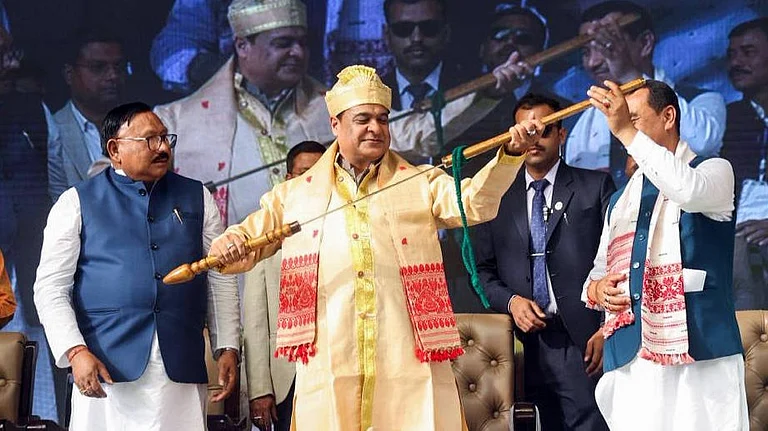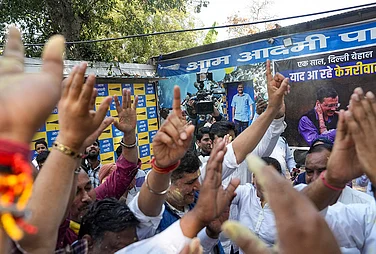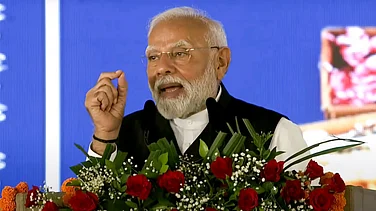With the Union government notifying the Citizenship Amendment Act (2019) four years after it was passed in the Parliament, Assam has once again witnessed protests, though muffled and less prolific than in 2019-20. The Himanta Biswa Sarma government, amid protests, has promised that those who had not applied for the National Register of Citizens (NRC) will not be given citizenship. However, a community that remains nervous is the Miya poets and activists, who had been at the forefront of the anti-CAA movement.
Miya Muslims refer to the East Bengal (present-day Bangladesh) immigrants who came to Assam in the 20th century under the colonial administration to work on the paddy fields in order to increase the region’s agricultural production. They settled mainly in the riverine islands of Assam, getting the moniker of ‘char chopari’. While the term ‘miya’ in Urdu refers to a gentleman, the word’s usage in Assam became a slur against Bengali Muslims who have historically faced the stigma of being a “foreigner” or “illegal immigrant” in Assam. Miya poet and scholar Dr Hafiz Ahmed from Guwahati states that a majority of youth in the Miya community oppose the CAA.
“This is because citizenship will only be granted to refugees from six particular religious communities. Muslims have been left out. This is anti-constitutional and against the secular fabric of India,” Ahmed alleges.
Miya poetry, which aims to wrest the word 'Miya' from its racial connotations, saw a political revival in 2019-20 as protests across the CAA-NRC intensified across the country. Starting with a few Miya poets whose poems about identity and political persecution became popular in Assam, the flavour spread across the nation with many poets including Varun Grover using poetry about identity to make their dissent heard with verses like ‘Hum Kagaz Nahi Dikhaenge’. Nearly four years since then, the spirit of protest seems to have fizzled out a bit. Despite localised protests in Assam since the Centre announced the CAA notification, Ahmed feels that widespread opposition to CAA remains missing this time.
“Many people who were at the forefront of the anti-CAA movement in Assam have now shifted over to the other side,” Ahmed tells Outlook over the phone.
The news has nevertheless left many Miya poets and academics restless and in fear. In July 2019, the Assam Police registered a criminal case against ten people, most of them Miya poets and activists. Rehna Sultana, who was one of the accused, says that the implementation of CAA in Assam could lead to the loss of Miya culture, which is very distinctive to Assam. The poet, who often writes about her Assamese roots and the politics of identity as a Muslim woman and Miya poet in Assam, says that at the moment many are concerned about it but unsure to speak out in fear of political reparation, harassment, or online trolling.
Sultana faced long months of the same in 2019 and was even compelled to go underground along with other Miya poets at the time. Another well-known translator and Miya poet who had been vocal about his support for the anti-CAA movement in previous years refused to comment on the CAA notification when approached by Outlook.
Critics of CAA feel that the law might end up unfairly targeting Muslims whose names do not make it to the National Registrar of Citizens. This, Ahmed feels, could be detrimental to the distinct culture of Assam.
“The Miya Muslims in Assam accepted Assamese as their mother tongue a long time back,” says Ahmed. The process started in 1899 when the first Assamese language school was established in this area. He adds, “The community has slowly been Assamised. They speak Assamese. There are no schools of other languages in Miya Muslim areas. They are proud to be associated with Assamese identity.”
By implementing CAA which may give citizenship to certain communities, Miya poets feel that Assamese language and culture will be diluted. “The example of Tripura is there for all to see,” Ahmed states.
Ahmed and other political commentators in Assam nevertheless feel that the move to notify CAA just ahead of elections has a deeper meaning behind it. “The BJP may be trying to consolidate its Matua votes in West Bengal,” Ahmed projects.
Indeed, villages across West Bengal’s Matua-dominated districts of North 24 Parganas, Nadia, Malda, North Bengal, and other parts have been celebrating since Monday with many celebrating the CAA notification as a long-overdue victory for their community.
Who Are Matuas, Why Are They Celebrating?
The Matuas are a Hindu community that migrated to India, first during the Partition and later after the 1971 Bangladesh Liberation War due to religious persecution and communal tension.
In colonial Bengal, the Namasudras belonging mainly to the anti-Brahmanical Matua sect were the single-largest Hindu caste group in eastern Bengal which later became East Pakistan in 1947 and Bangladesh in 1971.
After Partition the Namasudra-dominated districts went to Pakistan. The Namasudras initially decided to stay back in East Pakistan but later due to the worsening communal situation started to migrate to India. So, unlike in Punjab where there was a one-time exodus of people and a virtual exchange of population on religious lines during the Partition, in Hindu migration in Bengal happened in waves and is still happening.
“Whenever there was a major communal disturbance in East Pakistan/ Bangladesh exodus happened,” academic Ayan Guha explains. ‘The Curious Trajectory of Caste in West Bengal Politics: Chronicling Continuity and Change’ author states that a huge number of people were displaced in 1971 due to the Bangladesh Liberation War. “Under the present legal framework, their citizenship status is dubious and they face difficulty in issuance of passports, caste certificates, and getting government jobs,” Guha attests. Over the years the Indian citizenship laws and rules have become stricter, making the situation more challenging for such communities.
The Matuas’ movement for citizenship has always been a political struggle. Following the notification, shipping minister Shantanu Thakur hailed the Modi government for the move and said that the Matua community would no longer be dubbed as ‘infiltrators’. Thakur is the grandson of PR Thakur, whose great-grandfather Harichand Thakur founded ‘Matua-ism’ as a Vaishnavite religious reform movement.
While the community today is celebrating and many are taking the CAA notification as a win for the long movement, Guha, among others, remains critical.
“CAA is projected as a magic bullet that will solve all these issues by settling their citizenship status,” Guha says, adding that it needs to be underlined after the 2003 Citizenship Amendment Act they are legally illegal immigrants. “The problem, nevertheless dates back to 1971 when the government of India through a circular (letter no 26011/16/71-10 dated 29th Nov, 1971) stated its policy of not granting citizenship to those who crossed over to India from East Bengal since 25th March, 1971 on account of the Bangaldesh liberation war.”
Does CAA Notification Impact Elections In West Bengal?
Echoing Dr Hafiz Ahmed, Guha states that the BJP is likely to impress its Namasudra vote share which is already substantial. Despite assertions by analysts that the move may impact 50 seats in the Trinamool Congress (TMC)-run state, however, Guha defers. “In terms of Lok Sabha seats, the impact may not be much since the BJP is already quite well placed in Namasudra-dominated seats,” says Guha.
The Mamata Banerjee government is set to face stiff competition from the BJP which has been growing its seats and vote share in the state over the years. In the 2019 Lok Sabha elections, the BJP won 18 seats in the state. It wields considerable power in certain pockets — the majority of which are Matua-dominated. A report by News18 states that as per BJP’s internal survey, at least five seats across Nadia and North 24 Parganas districts and two to three seats in North Bengal are likely to be impacted by the notification.
In the long run, however, the support for BJP among the Matuas depends on implementation. Citizenship-granting mechanisms are bound to be bureaucratic and are likely to be afflicted with red-tapism. “Plus, proving citizenship in a fully satisfactory manner is so tricky and complex that it is difficult for any government or a system to handle it swiftly and to the satisfaction of the applicants. So complaints about the process might start pouring in as the process rolls out,” Guha explains.
In the long run, therefore, political support from the community will depend on how effectively the bureaucracy will function and how liberal it will be in processing citizenship applications.
Identity Politics In Assam And West Bengal
Meanwhile, in Assam, it is not just the Miya community that is concerned about the CAA notification. Nearly 19 lakh people have been left out of NRC in Assam which was updated in 2019, including lakhs of Hindus. The notification poses a dilemma for them now as people, who had previously asserted to be bona fide Indian citizens for NRC would now have to declare themselves as immigrants from either Bangladesh, Pakistan or Afghanistan. An Assamese activist on condition of anonymity states that the notification “goes against the Assam Accord, making it null and void”.
The 1955 Citizenship Act was amended in 1985 and the Citizenship (Amendment) Act and Section 6A was introduced as part of the Assam Accord intending to address the issue of illegal migration in Assam. “The CAA rules allegedly grant citizenship to illegal migrants. This contradicts the provisions outlined in the Assam Accord. Over 1,000 people were martyred in the years between 1979 to 1985. Thousands were killed. All of that will lose value now,” the activist states.
Since the notification, protests have been on in Assam across districts like Nalbari, Dibrugarh, Guwahati, and Golaghat. The All Assam Students’ Union (AASU) is at the centerstage of protests and presently has the support of 30 ethnic organisations and other student bodies like the Asom Jatiyatabadi Yuba Chatra Parishad (AJYCP) which organised rallies across the state on Tuesday. The protesters were all joined by members of Krishak Mukti Sangram Samiti (KMSS), which staged sit-in-protests in Golaghat district. Akhil Gogoi’s Raijod Dal, which was formed which was formed in 2020 following anti-CAA protests, has also been actively taking to the streets among others.


























